African startups are securing funding by creating pitch decks that resonate with investors. These decks focus on solving local challenges, showcasing growth metrics, and addressing market-specific needs. Here’s a quick overview of the key elements successful startups like Andela, Flutterwave, and Paystack used to secure investments:
- Problem-Solution Focus: Start with clear market challenges before introducing solutions.
- Traction Metrics: Highlight growth, user adoption, and partnerships.
- Tailored Value Propositions: Address local market needs with scalable solutions.
- Financial Clarity: Show a clear path to profitability and how funds will be used.
- Storytelling: Use relatable narratives to connect with investors.
These strategies helped startups like Andela achieve unicorn status and Flutterwave expand across Africa. By emphasizing market insights, operational milestones, and financial projections, these pitch decks demonstrated a strong understanding of investor expectations.
Below, we explore the standout strategies used by ten African startups to craft winning pitch decks and secure funding.
The Art of the Pitch: What Investors Really Want to Hear | A Fireside Chat
Andela’s pitch deck told a compelling story about connecting global opportunities with African tech talent. Founded in Lagos, Nigeria, in 2014, the company built its case for investors on a simple yet powerful idea.
A Value Proposition Rooted in Opportunity
“We believe that brilliance is evenly distributed, but opportunity is not.” – Co-Founder, Andela
This statement captured the heart of Andela’s mission: to spotlight Africa’s tech talent as a largely untapped resource. Initially focused on training developers, the company has since evolved into an AI-driven marketplace matching technologists from over 135 countries with global companies.
Andela’s approach went beyond traditional staffing. They invested in up-skilling programs for in-demand technologies, such as Kubernetes, through partnerships with major organizations like the Cloud Native Computing Foundation, Nvidia, Microsoft, and AWS. Their shift to a remote-first model in 2020 allowed them to scale globally, while maintaining strong ties to Africa and Latin America, where about 60% of their workforce is based.
This strategy not only addressed the global tech talent shortage but also created a scalable and impactful business model.
Impressive Metrics and Market Validation
The pitch deck highlighted Andela’s strong market presence with key achievements. The company developed a global talent marketplace with over 150,000 technologists from more than 135 countries. It has trained 15% of Africa’s 700,000 developers, underscoring its role in shaping the continent’s tech landscape. Serving over 600 organizations demonstrated clear market demand for its services.
Andela’s credibility was further boosted through strategic partnerships with leading cloud and tech companies. Notably, 90% of the roles created by companies working with Andela required Kubernetes expertise, showcasing the company’s alignment with market needs. These milestones culminated in Andela achieving unicorn status in 2021, with a valuation of $1.5 billion.
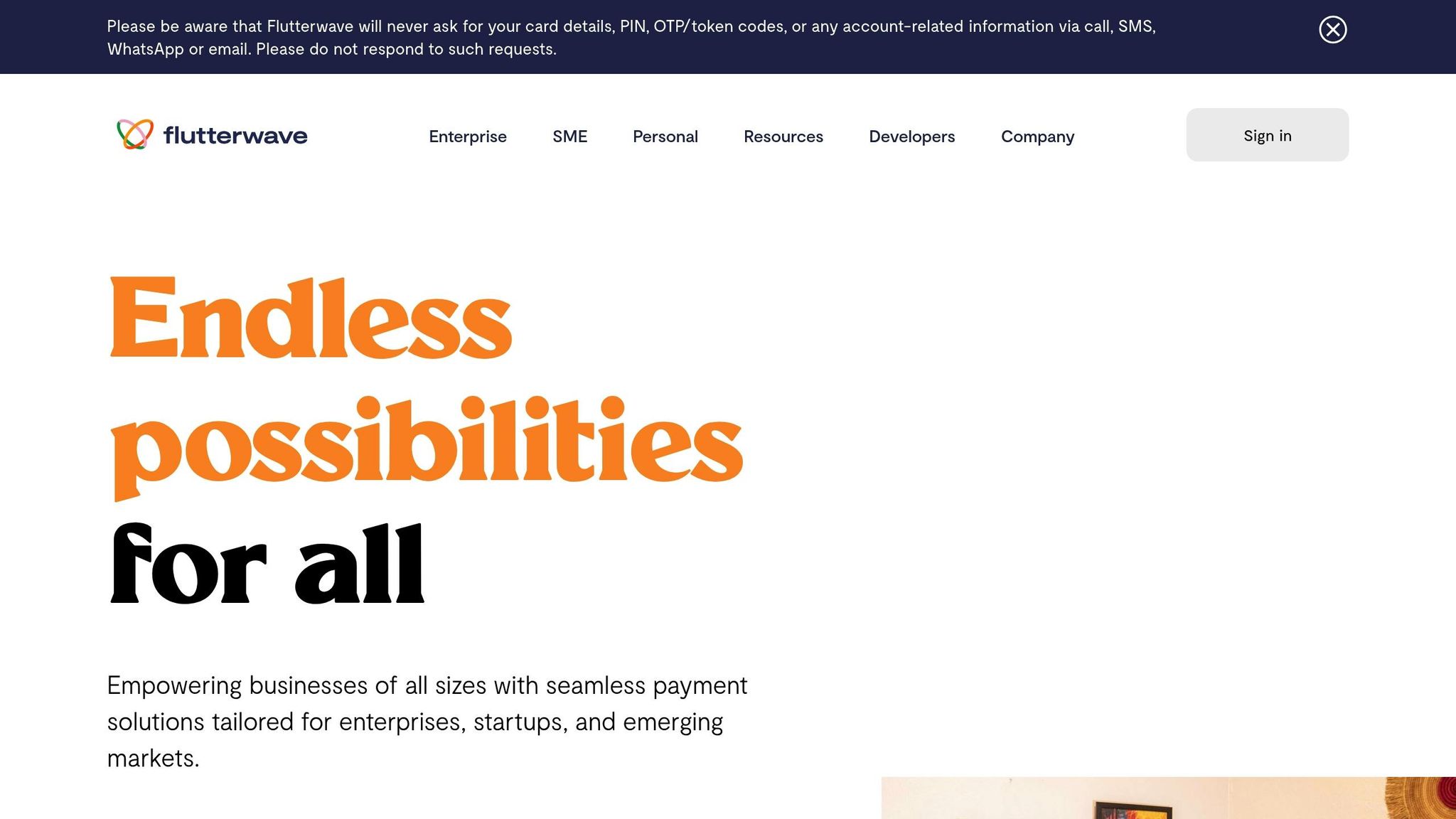
Flutterwave’s pitch deck highlighted its mission to connect African markets with global commerce. Founded in 2016 by Olugbenga Agboola, this Lagos-based company focused on solving the challenges of cross-border payments in Africa. Much like Andela, Flutterwave leveraged its deep understanding of the local market to address the continent’s unique needs.
Storytelling and Founder Narrative
Flutterwave leaned into authentic storytelling, drawing from real-world experiences with Africa’s payment hurdles. Instead of branding itself as the “PayPal of Africa”, the company emphasized its intimate knowledge of the region’s complexities. This approach positioned Flutterwave as a reliable problem-solver, deeply attuned to the realities of the local market.
Clear Value Proposition for Africa’s Needs
The pitch deck highlighted a set of key offerings, including a unified payment platform that supported multi-currency transactions, streamlined regulatory compliance, and integration with local payment methods like mobile money, bank transfers, and cards. By presenting itself as critical infrastructure rather than just another payment processor, Flutterwave showcased its ability to meet Africa’s specific requirements.
Traction Metrics, User Growth, and Partnerships
The deck demonstrated solid growth through rising transaction volumes, a varied customer base that included small businesses and global brands, and strategic international partnerships. Flutterwave’s gradual expansion into multiple African regions further illustrated the scalability and strength of its unified payment platform.
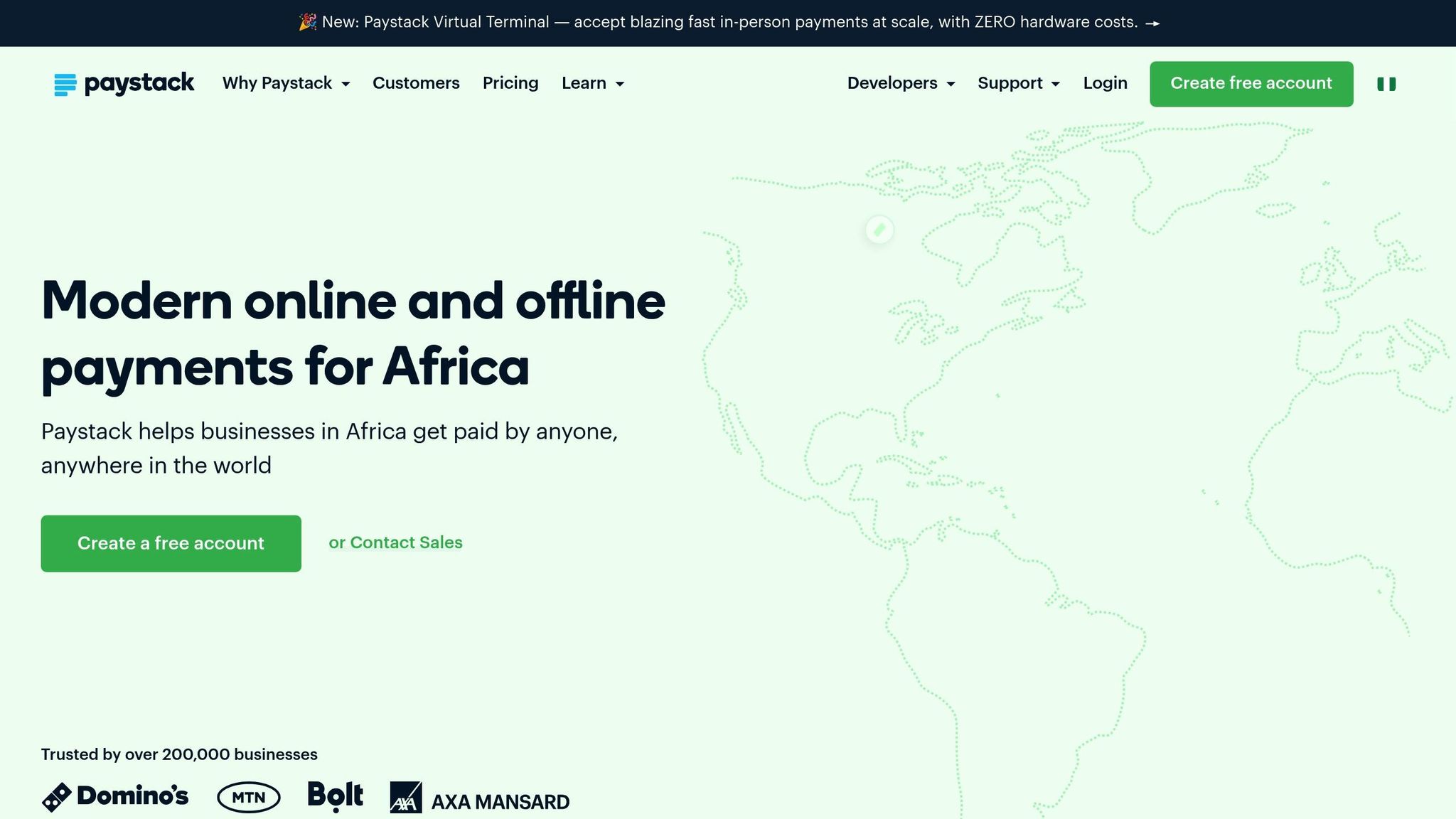
Paystack’s pitch deck tackled the pressing challenges in Africa’s digital payment landscape. It laid out a vision for improving local payment infrastructure and emphasized the importance of solutions tailored specifically to the region.
Storytelling and Founder Narrative
The founders drew from their own experiences with the inefficiencies of local payment systems. This personal perspective helped investors connect with the problem on a deeper level. By clearly illustrating the hurdles businesses faced, they made a compelling case for why a platform like Paystack was urgently needed.
A Value Proposition Built for Africa
Paystack’s pitch focused on addressing the unique realities of the African market. The presentation showcased a platform designed for seamless integration, support for commonly used local payment methods, and straightforward pricing. These features were positioned as key drivers of growth for African businesses, making the solution both practical and impactful. This clarity in the value proposition was backed by real-world market traction.
Traction Metrics and Strategic Partnerships
The deck highlighted early success through adoption rates, user growth, and meaningful partnerships. These metrics demonstrated a strong product–market fit and the potential for scalability. The growing network of merchants further validated the platform’s relevance and effectiveness across the region.
Financial Projections
Paystack also laid out financial projections that pointed to sustainable growth. With a transaction fee model at its core, the company outlined how it could expand its revenue streams as it scaled operations across the continent. This financial roadmap gave investors a clear picture of the business’s long-term viability.
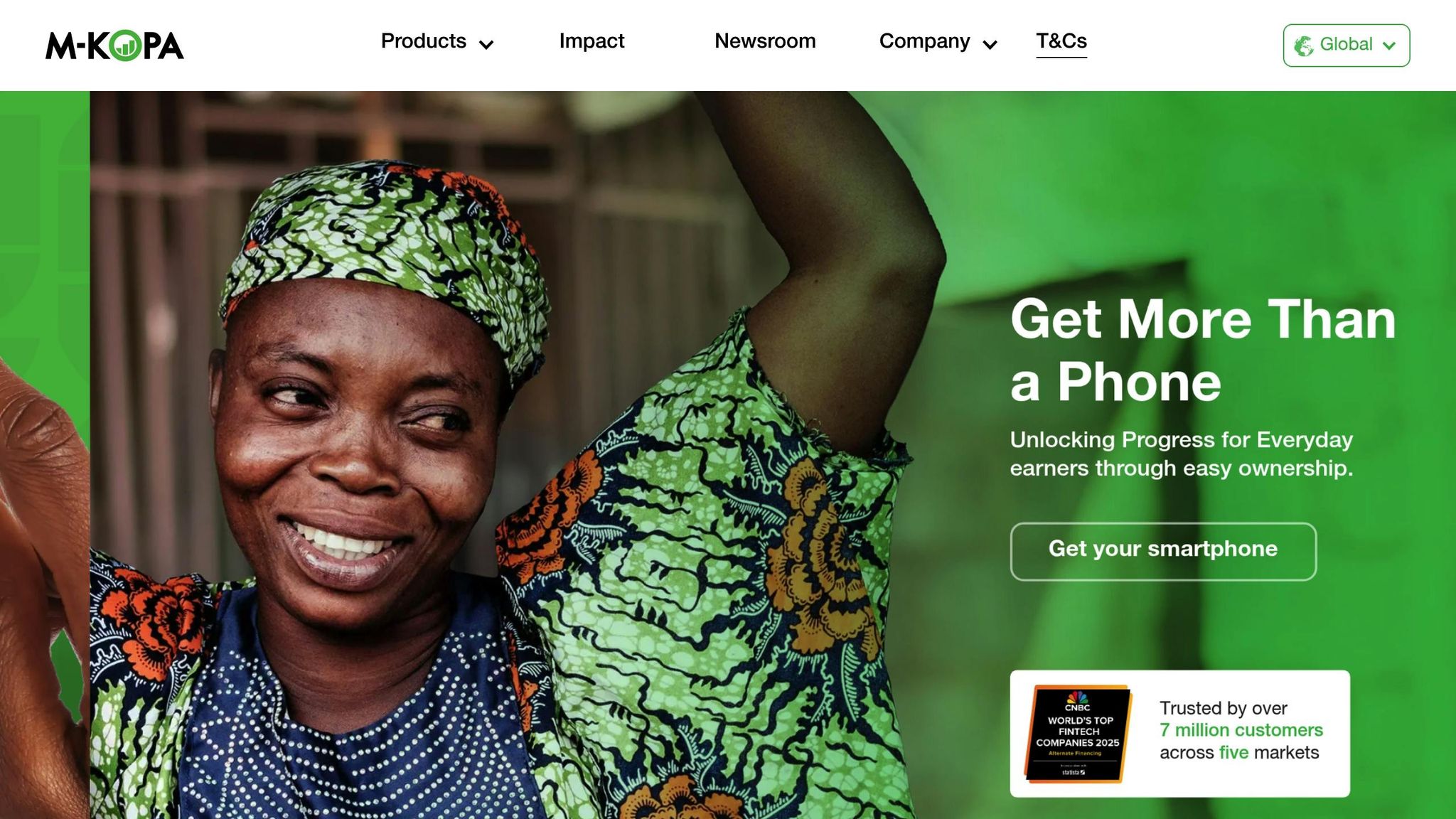
Storytelling and Founder Narrative
M-KOPA’s pitch deck takes a straightforward approach, presenting a clear problem-solution framework to highlight the issue of financial exclusion among everyday earners in Africa. The founders emphasized the pressing market need by stating, “Half a billion adults in Africa are not yet connected to the internet.” This statement effectively underscored the urgency of the situation and helped align the interests of stakeholders with the company’s mission.
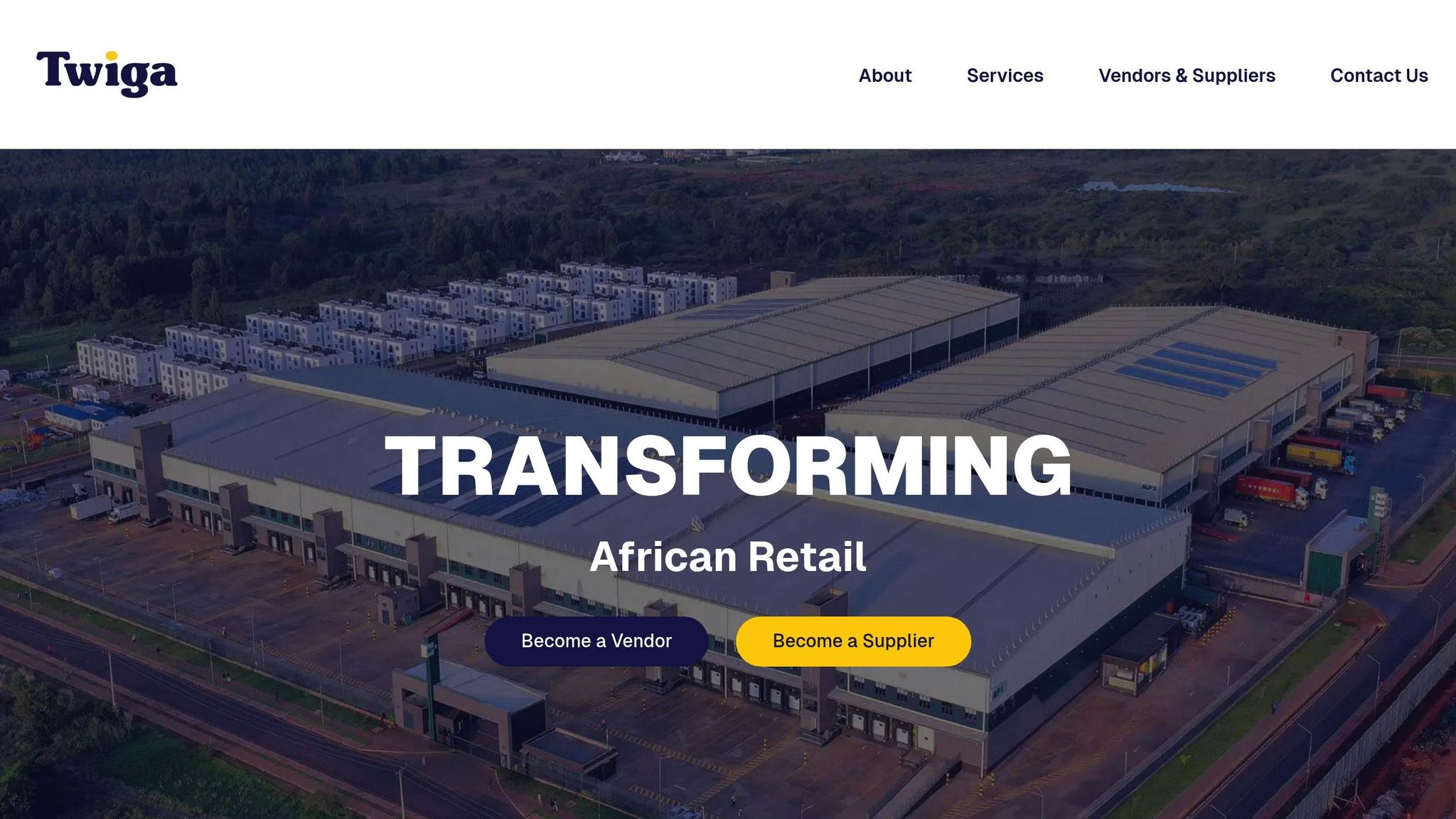
A Compelling Story and Vision
Twiga Foods built its pitch deck around the challenges faced by Africa’s agricultural sector. By highlighting these issues, the founders showcased their deep understanding of the industry and how their expertise could address the inefficiencies in local markets.
A Solution Designed for Africa’s Needs
The deck emphasized how fragmented traditional distribution channels were, creating inefficiencies and waste. Twiga Foods presented its solution: a mobile platform that directly connects farmers with retailers. This streamlined approach not only simplified the ordering process but also tackled food waste by improving logistics.
Proof of Success: Metrics and Partnerships
Twiga Foods backed its claims with hard data. The pitch included key traction metrics, user growth figures, and details of strategic partnerships with retailers and development organizations. These elements demonstrated that the model was already working and had significant potential for scaling, which gave investors confidence in the company’s growth trajectory.
Financials That Inspire Confidence
The financial section provided a clear breakdown of revenue streams and a well-defined path to profitability. By showcasing sustainable growth strategies, Twiga Foods reassured investors that their business model wasn’t just viable – it was built to last.
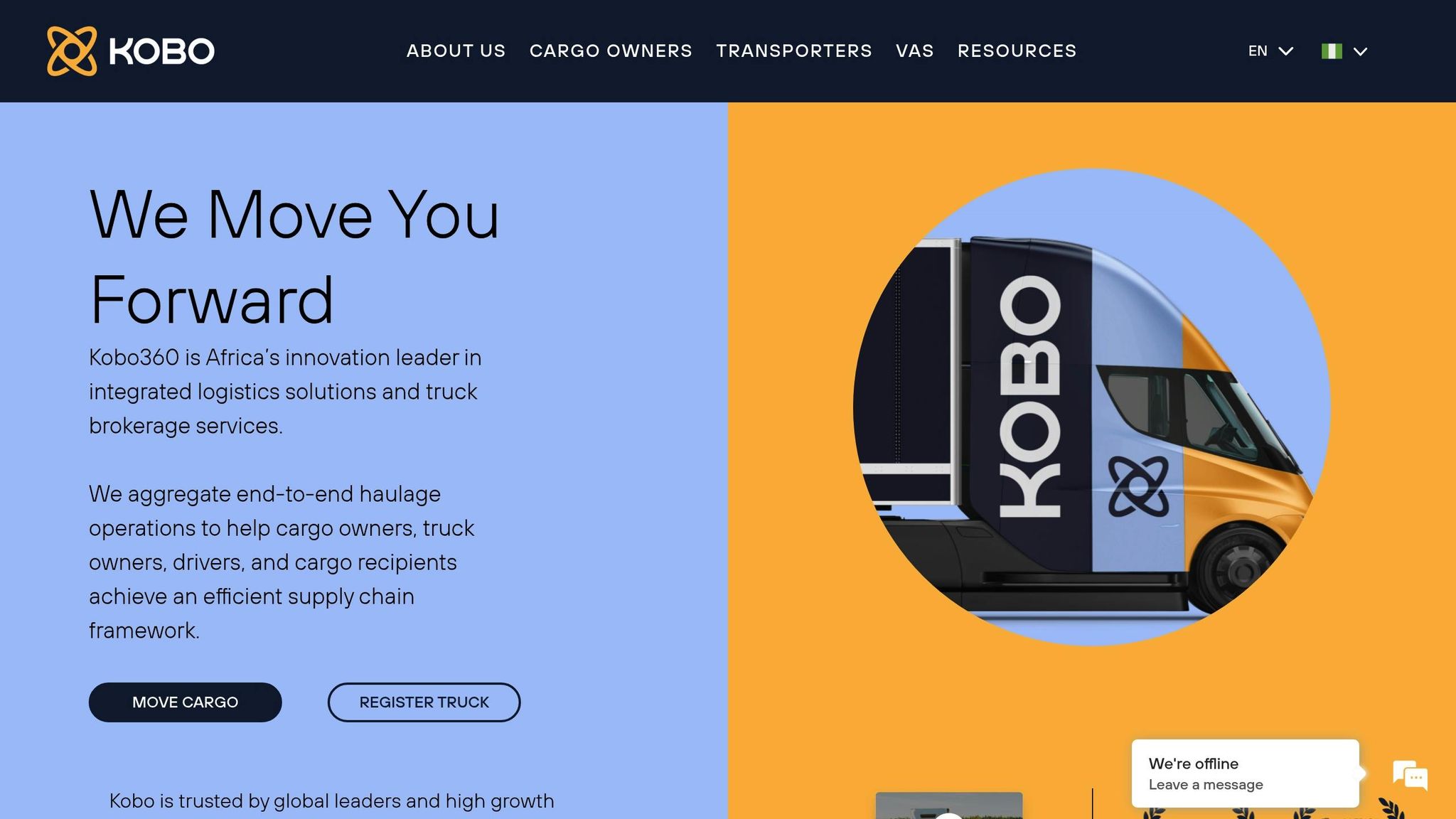
Storytelling and Founder Narrative
Kobo360’s pitch deck leaned heavily on a powerful narrative, showcasing Africa’s $150 billion transportation sector as a massive opportunity waiting to be tapped. CEO Obi Ozor framed the company not just as a logistics platform but as a transformative solution addressing the fragmented freight transportation system across the continent. This inefficiency often leaves both shippers and drivers struggling, and Kobo360’s mission was to change that by unlocking economic potential.
“We’re in a $150bn sector ripe with opportunity so you have to be dynamic when opportunities present themselves.” – Obi Ozor, CEO at Kobo360
Clear Value Proposition Tailored to African Market Realities
The pitch deck highlighted how Kobo360’s platform directly addressed local logistical challenges using mobile technology. By connecting cargo owners with truck drivers, the company reported a 40% increase in driver earnings and the creation of 150,000 jobs across Africa. This focus on solving region-specific issues made their value proposition resonate deeply with investors and stakeholders.
Traction Metrics, User Growth, and Partnerships
Kobo360’s operational numbers told a convincing story of growth and market validation. The company has moved over 9 billion kilograms of goods and built a network of more than 50,000 registered truck assets, serving over 700 enterprises. In its early years, it moved 500 million kilograms of goods and rapidly scaled to a fleet of over 10,000 trucks, eventually contributing to the massive cumulative movement of over 9 billion kilograms. These figures underscored the company’s strong presence in the industry. Additionally, the pitch deck highlighted strategic partnerships, including a notable collaboration with Unilever Nigeria.
“So pleased to see the partnership between Unilever Nigeria and Kobo360 continue to grow sustainably. Looking forward to what the future holds as there’s certainly more to come.” – Tobi Adeniyi, Supply Chain Director, Unilever
Financial Projections
The company leveraged the African Continental Free Trade Agreement (AfCFTA), which opens up a market of 1.3 billion people with a trade volume of $1.3 trillion, to emphasize its growth potential. Kobo360’s revenue climbed to $30 million in 2024, up from $20.5 million in 2023 and $21.9 million in 2021. The pitch also highlighted plans to scale operations into 10 new countries, showcasing the business’s potential for expansion. According to Jules Frebault from Goldman Sachs, the scalability of Kobo360’s model across African markets was a key factor in securing the $30 million Series A funding round led by Goldman Sachs in August 2019.
“Credibility has been our most important asset to our success – this is how we’ve been able to position ourselves in front of global investors such as Goldman Sachs. Our track record speaks for itself – we’ve moved over 5000Mkg, aggregated a fleet of over 10,000, serviced thousands of SMEs and partnered with over 80 global logistics partners including Dangote Group, DHL and Unilever – all within two years.” – Obi Ozor, CEO at Kobo360
sbb-itb-dd089af
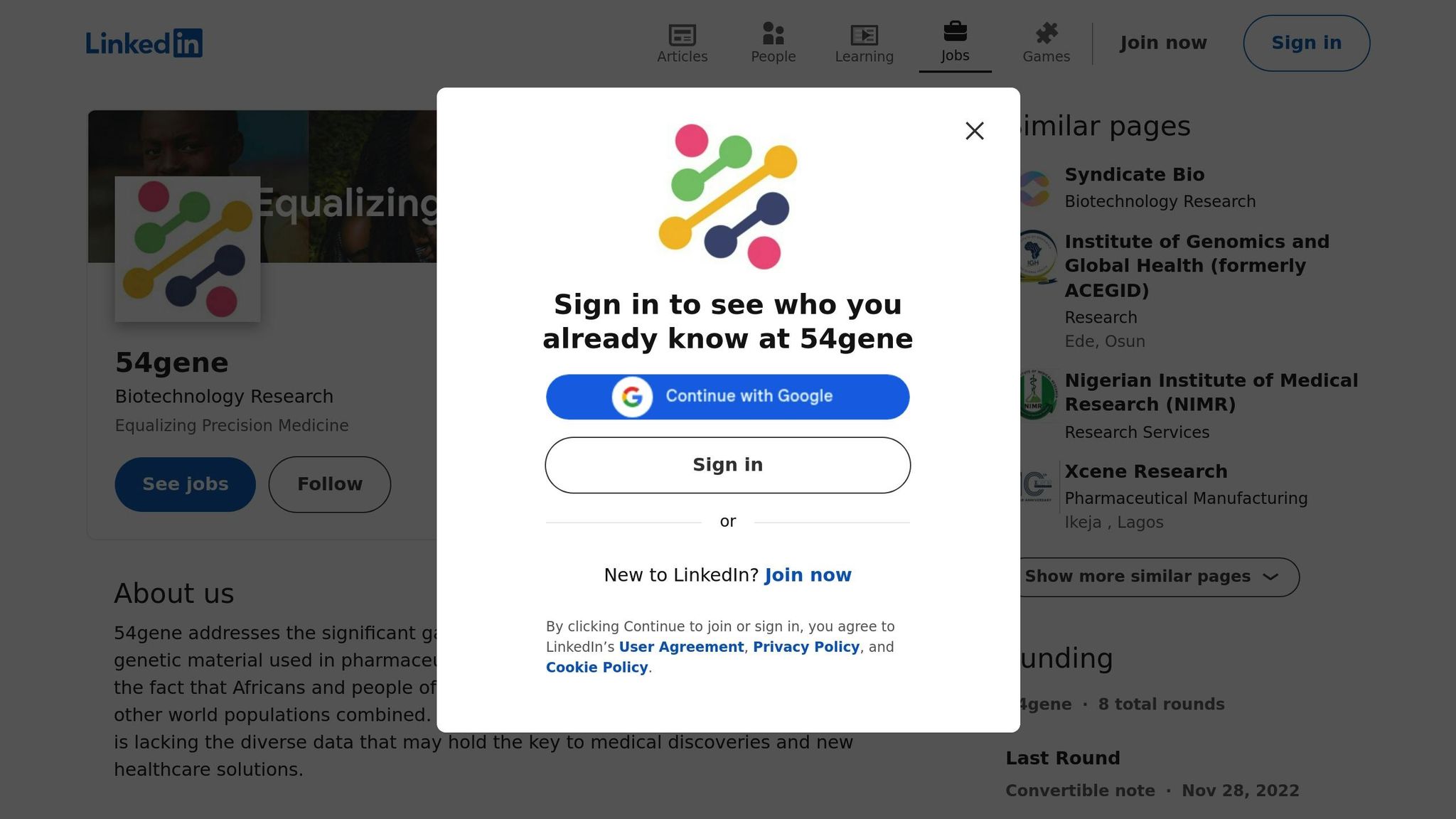
Storytelling and Founder Narrative
54gene’s pitch deck made a compelling case for improving the representation of African genetic data in global research. Founder and CEO Abasi Ene-Obong shared a powerful story about Africa’s largely untapped genetic potential, emphasizing how inclusive research could lead to groundbreaking treatments and better health outcomes. This narrative struck a chord with investors, positioning 54gene as a company with the dual appeal of driving social progress and delivering strong business results.
Clear Value Proposition Tailored to African Market Realities
The pitch deck built on this narrative by presenting a clear value proposition that addressed both local healthcare challenges and global pharmaceutical needs. It showcased 54gene as a genomics company focused on genetic testing and building a biobank. By prioritizing diseases that disproportionately affect African populations, the company aimed to enhance diagnostic tools and speed up the development of targeted treatments – making the case for its relevance and importance.
Demonstrating Traction Through Growth and Partnerships
To back up its vision, 54gene highlighted its early successes, including partnerships with pharmaceutical companies, research institutions, and healthcare organizations. The company also showcased its efforts to scale, such as opening genetic testing labs in strategic locations and expanding its sample collection. These steps not only strengthened its database but also demonstrated its ability to grow and make an impact on genetic research.
Financial Projections
The pitch deck rounded out its case with a detailed revenue model. It combined income from direct genetic testing services with revenue from partnerships with pharmaceutical companies. This scalable business approach showed how 54gene planned to meet the increasing demand for advanced genetic research and testing, while also emphasizing its potential for both financial success and meaningful social contributions.
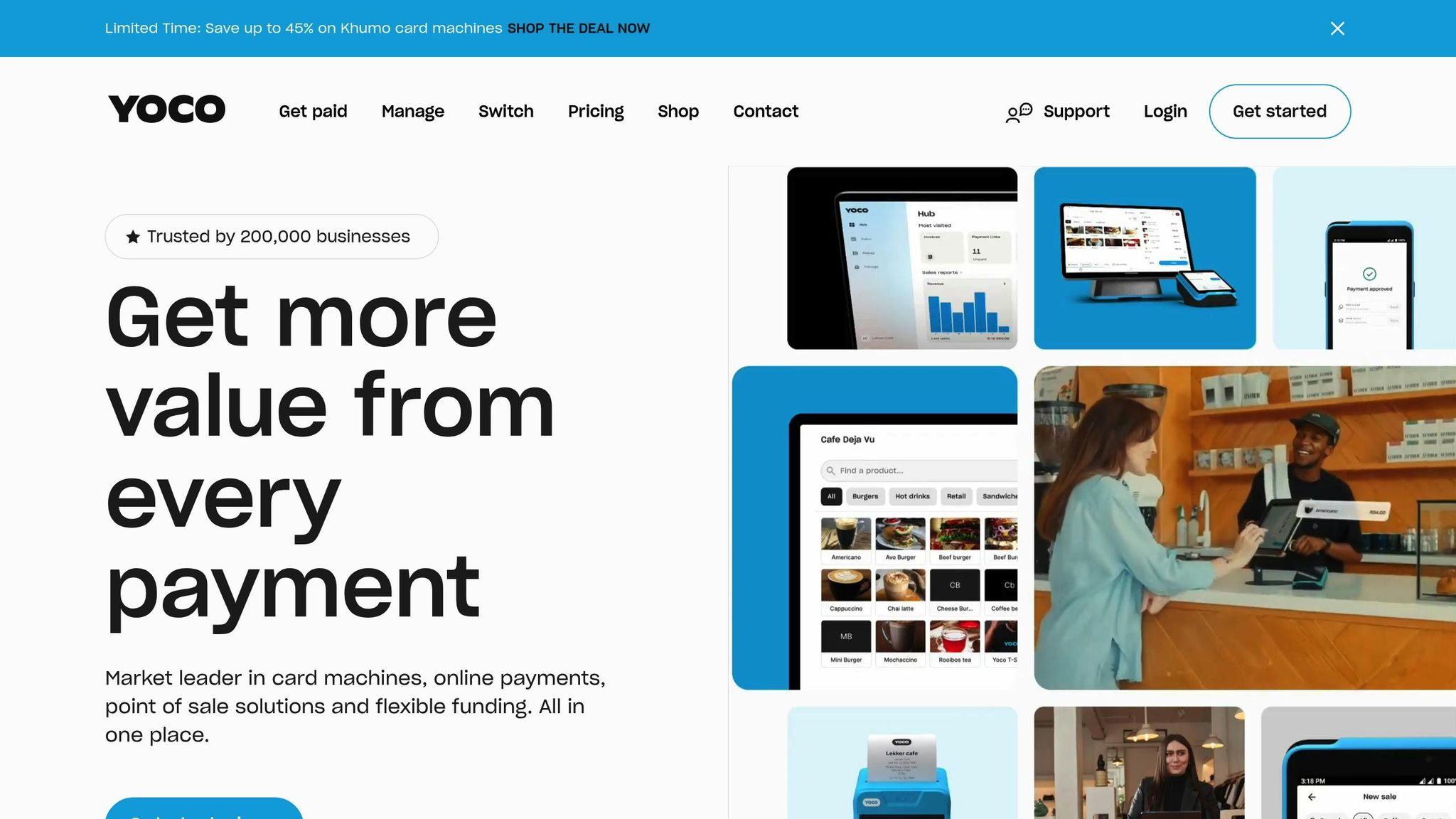
Focused on Solving Payment Challenges for South African Businesses
Yoco’s pitch deck skipped the storytelling fluff and went straight to the point: improving payment processing for small and medium-sized businesses in South Africa. This clear, market-specific approach mirrors the strategy seen in other successful African fintech presentations, keeping the focus on solving real problems for local businesses.
Highlighting Growth, Market Potential, and Partnerships
To back up its value proposition, the deck showcased key metrics like user growth and strategic partnerships, illustrating the market potential and scalability of their solution. This positioned Yoco as a serious contender in the fintech space, with a clear path to expansion.
Revenue Model and Financial Outlook
Yoco’s financial plan revolved around a transaction-based revenue model, offering a clear and scalable route to profitability. Like other fintech leaders, the deck emphasized a focus on sustainable, long-term growth, reinforcing confidence in their business strategy.

Addressing Africa’s Logistics Challenges Head-On
Lori Systems crafted a pitch deck that zeroed in on Africa’s pressing logistics issues. By highlighting the inefficiencies in cargo transportation across the region, they positioned themselves as a game-changing solution. Their idea? A digital platform designed to seamlessly connect supply and demand while tackling the unique infrastructural challenges of the continent. This focused approach made their market positioning both compelling and practical, laying the foundation for showcasing their progress.
Growth Backed by Strategic Collaborations
The presentation emphasized Lori Systems’ steady growth in user adoption, further strengthened by partnerships with major players in the logistics industry. These collaborations not only validated their business model but also demonstrated their potential for scaling effectively.
A Revenue Model Built for Sustainability
Lori Systems outlined a clear financial strategy that tied their success to their customers’ savings. Their commission-based revenue model reflected this alignment, highlighting strong unit economics and organic growth as key drivers. The deck painted a picture of a business built for long-term profitability and sustainable expansion.
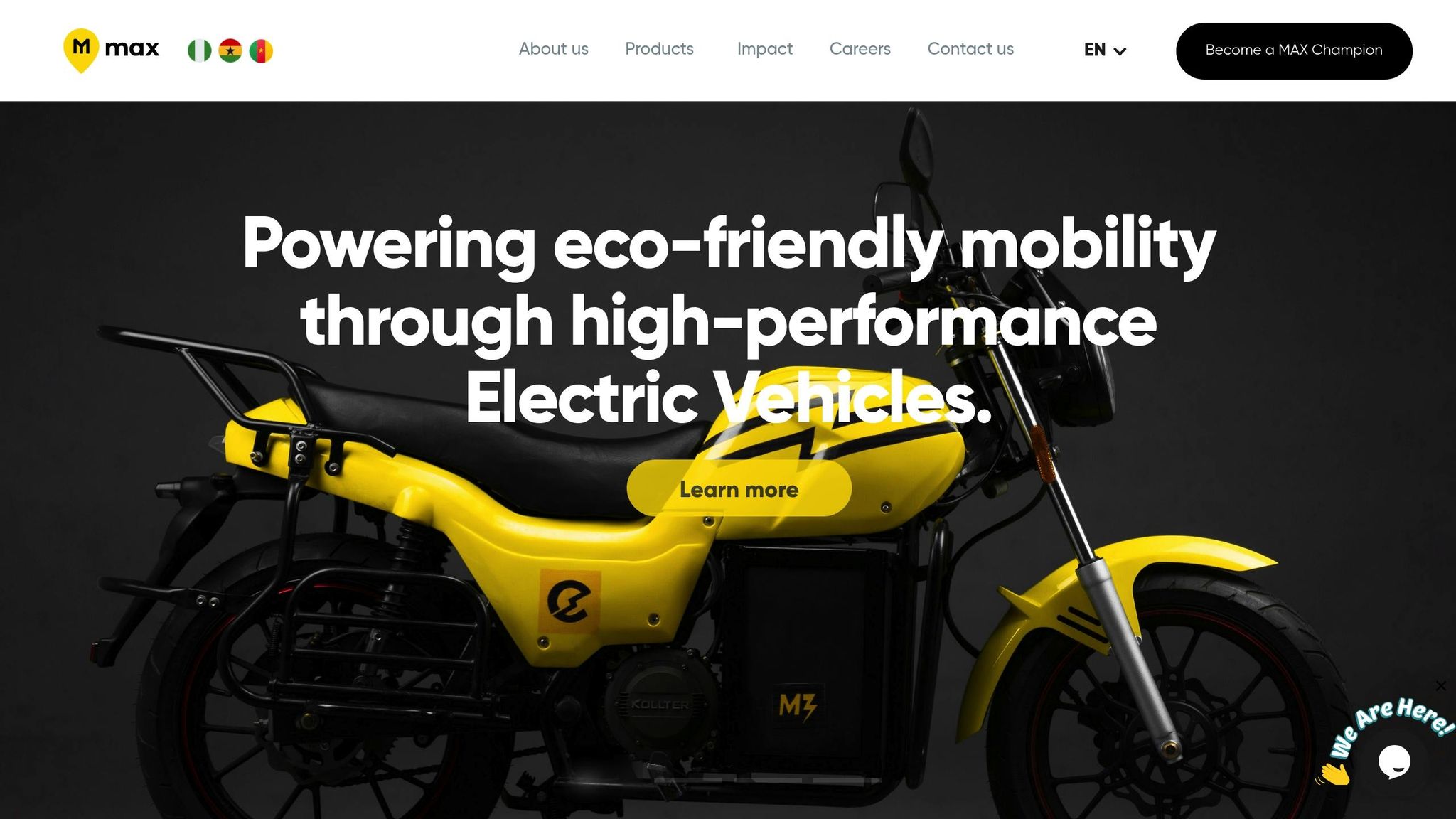
Addressing Nigeria’s Transportation Challenges
Max.ng’s pitch deck zeroed in on a pressing issue in Nigeria: the lack of reliable and affordable transportation options. The startup proposed a practical solution – motorcycle taxis – as a quicker and more efficient alternative to traditional car ride-hailing services in Nigeria’s traffic-heavy cities. By focusing on speed, convenience, and accessibility, the presentation effectively demonstrated how Max.ng could transform daily commutes in crowded urban areas.
Strong User Growth and Strategic Partnerships
The deck highlighted impressive user growth and solid market traction, underscoring Max.ng’s success in gaining a foothold in the transportation sector. It also outlined the company’s plans to expand to more cities across Nigeria. Partnerships with local government bodies and transportation authorities played a key role, showcasing the startup’s ability to work within regulatory frameworks while building trust and credibility. These alliances also opened doors for additional support, reinforcing the company’s legitimacy.
Financial Viability and Path to Profitability
Max.ng backed its growth story with detailed financial projections. The deck introduced a commission-based revenue model with solid unit economics, showing how each ride could generate sustainable margins while keeping fares affordable for everyday users. It also laid out a clear strategy for scaling operations and improving route efficiency, paving the way toward profitability as the business grew.
Pitch Deck Strategy Comparison
Startups raised funding with pitch decks that took different approaches in design, storytelling, and how they presented financial data.
Some decks leaned on minimalist designs, using clear visuals to communicate data, while others focused on visual storytelling to engage their audience. The way they structured their narratives also varied. For example, some began by laying out market challenges before introducing their solutions. Others jumped straight into showcasing the innovative features of their product to emphasize market traction. A few combined these methods, weaving their pitch into broader market trends and local specifics.
When it came to financials, approaches ranged widely. Some startups presented detailed unit economics and broke down transaction metrics, while others prioritized showcasing growth projections and recurring revenue potential.
Many of these pitch decks also demonstrated a deep understanding of local regulatory hurdles and regional dynamics, emphasizing their scalability. It was clear that startups often refined their presentations based on investor feedback, sharpening both their storytelling and financial details.
What stands out is that there’s no one-size-fits-all formula for an effective pitch deck. Success comes from tailoring the presentation to address specific local challenges while aligning with global investment trends. These different strategies pave the way for actionable insights in the sections ahead.
Key Takeaways and Practical Tips
Drawing from the strategies discussed earlier, here are actionable tips to help craft effective pitch decks for African startups. These insights, inspired by real success stories, emphasize how structure, clarity, and strategic focus can pave the way to securing funding.
African startup pitch decks that succeed often follow certain key patterns. These go beyond just good presentation skills – they address exactly what investors want to see in emerging markets.
Start with the problem, not the solution. The most compelling decks establish credibility by first identifying the market challenges before diving into the solution. This approach resonates particularly well with African startups, as it demonstrates a deep understanding of local market dynamics while aligning with broader global investment themes.
Highlight traction with diverse metrics. Investors want to see a complete picture. Go beyond revenue figures by including user growth, market penetration, and operational milestones. This mix of data paints a clearer picture of your business’s current performance and future potential.
Tackle regulatory and infrastructure challenges upfront. Acknowledge the hurdles your market presents, whether regulatory or infrastructural, and explain how your team has addressed or plans to address them. Investors appreciate founders who turn these challenges into opportunities, showcasing their ability to execute in complex environments.
Match financial projections to your business model. Use metrics that best fit your business type. For example, transaction-based businesses might focus on unit economics, while subscription models could highlight customer lifetime value or cohort analysis. The goal is to demonstrate a clear path to profitability and growth.
Prioritize clarity over flashiness. Investors value clear, well-organized decks over overly creative designs. Use clean layouts, consistent formatting, and clear charts or graphs to make your key points stand out. Remember, investors often review dozens of decks in a short period – make yours easy to follow.
Customize for different audiences. Tailor your deck to suit your audience. For local investors, provide more detailed insights into the market landscape. For international investors, focus on competitive analysis and global relevance.
Tell a story, not just facts. Your slides should support a compelling narrative. Founders who can connect the dots between the market opportunity, their solution, and growth potential tend to leave a stronger impression on investors.
Include realistic timelines and milestones. Be specific about your goals and how they align with funding rounds. Investors appreciate clear timelines that outline when and how they can expect returns on their investment.
Turn local market dynamics into strengths. Successful decks often position African market characteristics as competitive advantages. Whether it’s mobile-first user behavior, leapfrog technology adoption, or addressing underserved segments, framing these as strengths can set your pitch apart.
Be precise about funding needs and allocation. Clearly state how much funding you need, how you’ll allocate it, and what outcomes you expect. This level of detail shows strategic foresight and helps investors assess the opportunity.
These strategies highlight what has worked for startups that successfully raised capital. By adapting these approaches to your own market, business model, and audience, you can create a pitch deck that not only tells your story but also resonates with investors.
Conclusion
Turning an idea into a funded startup begins with a pitch deck that effectively communicates your value and traction. Clear messaging and strong execution are the foundation for securing investment.
Take Numida, for example, which raised $12.3M in 2022 using a streamlined 10-slide deck, or Afrocenchix, which secured $1.2M in seed funding in June 2021. Both startups stood out by presenting innovative solutions and demonstrating solid market traction. These examples highlight a growing trend: modern pitch decks rely on visuals, concise data, and clear metrics to quickly convey market understanding and scalability.
The key takeaway? Authenticity matters more than striving for perfection. Focus on showcasing your unique market impact. Successful founders emphasize their value propositions and practical solutions to address pressing market needs. Whether you’re appealing to local or international investors, your deck must prove you’re solving problems that truly matter.
As shown in these success stories, a tailored approach can resonate with investors across the board. The African startup ecosystem is evolving, and these examples provide a blueprint for navigating it. Remember, your pitch deck isn’t just a presentation – it’s the first step in bringing your vision to life.
FAQs
What key elements make an African startup’s pitch deck stand out to investors?
A strong pitch deck from an African startup typically lays out a clear problem statement paired with a practical solution that meets a genuine market need. It should also emphasize the market size and growth potential, present a scalable business model, and include financial projections that showcase the path to profitability. Clearly stating a specific funding request adds focus and direction.
To grab investors’ attention, the deck should weave a compelling narrative, showcase a skilled and experienced team, and feature visually appealing slides that make the content easy to digest. These components work together to establish trust, highlight growth potential, and demonstrate market relevance – key factors in securing investment.
How do African startups design pitch decks to address local challenges and highlight growth opportunities?
African startups design their pitch decks to reflect a clear grasp of the challenges unique to their regions, such as infrastructure hurdles, complex regulations, and unmet market needs. By tackling these issues head-on, they prove their ability to address and solve pressing problems.
These startups also shine a spotlight on the immense potential of local markets, focusing on sector-specific opportunities and tailoring their solutions to fit regional demands. This strategy not only establishes trust with investors but also highlights the untapped growth possibilities in the African startup landscape. By aligning their plans with on-the-ground realities, they craft presentations that genuinely connect with stakeholders and leave a lasting impression.
Why is storytelling important in pitch decks for African startups?
Storytelling plays a key role in pitch decks, helping investors emotionally connect with your startup’s vision and mission. A well-crafted narrative can take complex concepts and make them easier to understand, transforming raw data into a story that sparks confidence and action.
By incorporating storytelling into your pitch, you can emphasize what sets your startup apart, illustrate the problem you’re addressing, and explain why your solution is meaningful. This method not only grabs attention but also ensures your pitch leaves a lasting impression, making it more persuasive and increasing the likelihood of securing funding.
Related posts
/* Shares”}};
/* ]]> */


















